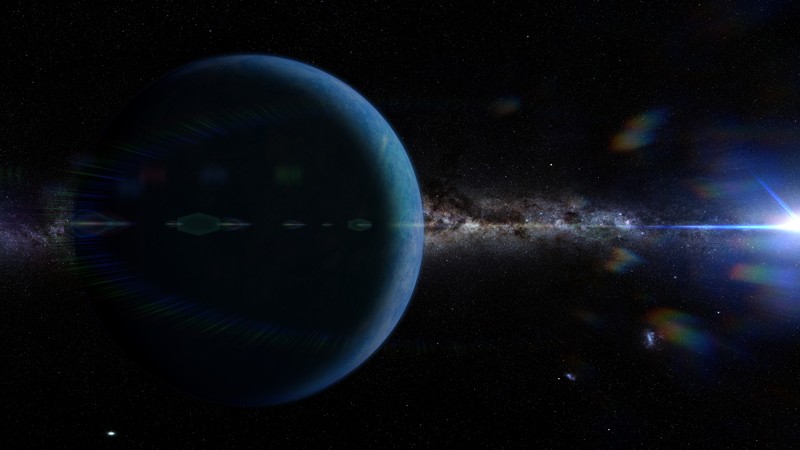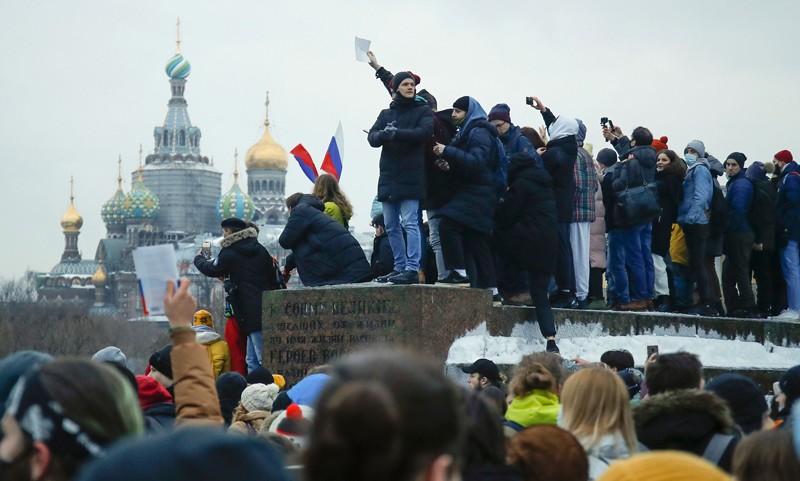No sign of Planet Nine?
For some years, scientists have debated the existence of an unseen planet at least five times the mass of Earth in the outer reaches of the Solar System. Now, the hypothesis has been dealt a blow by a new analysis of distant, icy objects.
The presence of Planet Nine was proposed in 2016, when astronomers observed that the orbits of six trans-Neptunian objects (TNOs) — part of the Kuiper belt, a collection of small bodies orbiting the Sun beyond Neptune — seemed to be clustered together (K. Batygin and M. E. Brown Astron. J. 151, 22; 2016). This clustering, they said, had to be due to the gravitational pull of a huge planet somewhere in the outer Solar System. But not all researchers were convinced. Other surveys cast doubt on whether TNOs were in fact clustered.
In the latest work, a team led by Kevin Napier, a physicist at the University of Michigan in Ann Arbor, combined three surveys to examine the orbits of TNOs. It found that after accounting for selection bias — the fact that astronomers have observed only a small portion of the outer Solar System — the data suggest that the objects are uniformly distributed across the sky (K. J. Napier et al. Preprint at https://arxiv.org/abs/2102.05601; 2021). However, the findings do not rule out the possibility of a ninth planet orbiting the Sun, and more data will be needed to settle the debate.
Russian academics decry change to education law
Academics in Russia are protesting against a proposed law change that they say will damage academic freedom and free speech. The amendment to Russia’s law on education, which lawmakers say is intended to stop anti-Russian propaganda, would require academics and educators to get permission to do public outreach for educational activities, including those involving science.
A petition against the change — which Russia’s lower house of parliament, the State Duma, will consider in a future vote — has drawn more than 220,000 signatures and threats of civil disobedience by researchers who say that the amendment could curb efforts to boost scientific literacy.
The presidium of the Russian Academy of Sciences has called on Duma members to reject the bill. The suggested changes run counter to efforts to modernize Russian science, academy leaders say.
“Activities that enlighten society about scientific achievements are developing rapidly in Russia, and scientists consider this mission useful for the whole society,” says academy vice-president Alexei Khokhlov. “The proposed law doesn’t support these activities, it gives only restrictions. Any form of restrictions are not helpful for the development of society.”
Longer infections could fuel COVID variant’s spread
Preliminary findings suggest that B.1.1.7, a SARS-CoV-2 variant first identified in the United Kingdom, might be more transmissible than earlier variants because it spends more time inside its host.
Previous studies have estimated that B.1.1.7, which is now spreading rapidly in a number of countries, is roughly 50% more contagious than earlier coronavirus variants. Yonatan Grad at the Harvard T. H. Chan School of Public Health in Boston, Massachusetts, and his colleagues examined the results of daily SARS-CoV-2 tests on 65 people infected with the virus, including 7 infected with B.1.1.7 (S. M. Kissler et al. Preprint at https://go.nature.com/3qmcj4j; 2021). The team looked at how long the virus persisted, and the amount of virus present at each time point.
In people with B.1.1.7, infections lasted an average of 13.3 days, compared with 8.2 days in those with other variants. These findings hint that B.1.1.7 is more easily transmitted than other variants because people who catch it are infected for longer, and can therefore pass the virus on to more contacts. This suggests that longer quarantine periods might be warranted for individuals infected with this variant.
https://www.nature.com/articles/d41586-021-00459-4
2021-02-24 09:22:21Z
CBMiMmh0dHBzOi8vd3d3Lm5hdHVyZS5jb20vYXJ0aWNsZXMvZDQxNTg2LTAyMS0wMDQ1OS000gEA
Bagikan Berita Ini


















0 Response to "Planet Nine, Russian education law and COVID variants - Nature.com"
Post a Comment